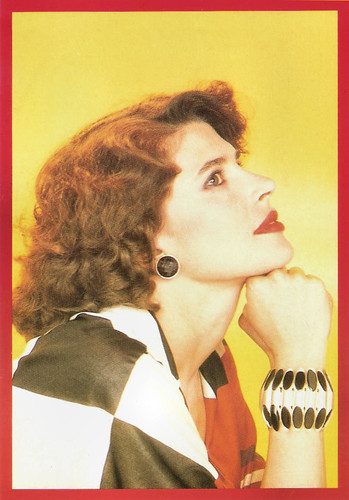
French postcard in the Collection Cinéma by Editions La Malibran, Paris, no. CF 68, 1990. Fanny Ardant in Vivement dimanche!/Confidentially Yours (François Truffaut, 1983).

French postcard by Editions Atlas, Evreux, no. 36. Photo: Gérard Letallier / Télé 7 jours Fanny Ardant and Francis Huster in the TV Mini-Series Les Dames de la Côte (Nina Companeez, 1979).
Tragic lovers
Fanny Marguerite Judith Ardant was born in Saumur, France in 1949. Her father Jean Ardant was a military attaché. Fanny grew up in Monaco where her father worked as an adviser for the royal family. She subsequently spent much of her childhood moving around Europe. At 17, she moved to Aix-en-Provence to study political science at the Institut d'études politiques d'Aix-en-Provence. But she was more passionate about the theatre and took drama classes from Jean Périmony.
In 1974 she made her first stage appearance in 'Polyeucte' by Pierre Corneille. The play was directed by Dominique Leverd, who would be the father of her first daughter, Lumir. Roles in plays by Henry de Montherlant, Jean Racine and Jean Giraudoux followed.
Her film debut was a small part in Marie-poupée/Marie, the Doll (Joël Séria, 1976). For TV she played one of the leading roles in the prestigious Mini-series Les Dames de la Côte/The ladies of the coast (Nina Companéez, 1979) starring Edwige Feuillère.
Legendary film director François Truffaut saw the series and noticed her. Truffaut was captivated by Ardant’s unconventional beauty - her dark eyes, her wide mouth, her triangular face and her deep voice. He invited her to a lunch with Gérard Depardieu, with whom he had just made Le Dernier metro/The Last Metro (François Truffaut, 1980). Dépardieu and Ardant had earlier acted together in the film Les chiens/The Dogs (Alain Jessua, 1979). Truffaut then cast Dépardieu and Ardant as tragic lovers in La Femme d'à côté/The Woman Next Door (François Truffaut, 1981).
Tom Wiener at AllMovie: “The Woman Next Door has a story line right out of a soap opera. Fortunately, it plays like variations of a half-dozen other intelligent Truffaut films on the vagaries of love. Depardieu and Ardant evince such potent chemistry that it's hard not to root for their characters, Bernard and Mathilde, even as you see them slide toward tragedy.” Her role became her international breakthrough and Ardant received her first César nomination for Best Actress in 1982. During the production of the film, the director and actress had fallen in love. Ardant became the last muse and partner of Truffaut. In 1983 she gave birth to their daughter, Joséphine.
Romanian postcard by Casa Filmului Acin, no. 43034.

Romanian postcard by Casa Filmului Acin no. C.P.C.S. 43034.
Devastated
By the early 1980s, Fanny Ardant had turned into a major European film star. Fluent in English, Spanish and Italian, she played serious, passionate roles in several international films. In Italy she worked with director André Delvaux at Benvenuta (1983) as a pianist unhappy in love with Vittorio Gassman, and with Ettore Scola at the award winning family drama La famiglia/The Family (1987).
In France, she worked with Truffaut again at the comedy Vivement dimanche!/Confidentially Yours (François Truffaut, 1984), a homage to the Film Noir, shot in black & white. She played a self-assured secretary who helps a murder suspect (Jean-Louis Trintignant) to prove his innocence.
James Travers at Films de France: "Stylistically, Vivement dimanche! is an almost faultless pastiche of the classic film noir (laden with countless references to the films of Alfred Hitchcock, Truffaut’s personal hero), but what most gives it its charm is a persistent vein of downbeat humour, which is so wonderfully incongruous with the theme and style of the film. The comic highpoint is the scene in which Fanny Ardant interviews a dumb blonde as her replacement - it has nothing to do with the plot but it is one of the funniest asides in Truffaut’s entire oeuvre."
For her role she received her second César nomination. In 1984, Truffaut died from a cancerous brain tumour, and left Ardant devastated. However, her career flourished. She played several plum roles for major directors. For Volker Schlöndorff, she appeared in his Marcel Proust adaptation Un amour de Swann/Swan in Love (1984) opposite Jeremy Irons, for Alain Resnais in L’Amour à mort/Love Unto Death (1984) with Sabine Azéma, and in Mélo/Melodrama (1986), for Costa-Gavras in Le conseil de famille/Family Business (1986) with Johnny Hallyday.
Later she acted for Michelangelo Antonioni and Wim Wenders in Al di là delle nuvole/Beyond the Clouds (1995). Among her English language roles were Afraid of the Dark (Mark Peploe, 1991) with James Fox, and Sabrina (Sydney Pollack, 1995) with Harrison Ford. Over time, her sophistication and acting skills have made Ardant one of France's most admired and popular actresses.

French postcard by Humour a la Carte, no. ST-157.

French postcard by Humour a la Carte, Paris, no. 3713.
Acidic noblewoman
In 1996, Fanny Ardant proved her versatility, playing a comedic role in Pédale douce/What a Drag (Gabriel Aghion, 1996) for which she won the 1997 César Award for Best Actress. She spoofed her sophisticated screen image as the confidante of a gay businessman who agrees to pose as his wife to impress a banker and then finds herself romantically pursued by the banker.Another major success was her role as the acidic noblewoman Madame de Blayac at the court of Louis XVI in Ridicule (Patrice Leconte, 1996). This historic film was also very popular with the public, won the César for Best Film and was nominated for an Oscar for Best Foreign Film.
She was then directed by Roman Polanski as Maria Callas in Terrence McNally's play 'Master Class', at the Théâtre de la Porte Saint-Martin. For her portrayal, Ardant was nominated for the Molière award as Best Stage Actress. She portrayed the opera diva again in the English-language film Callas Forever (Franco Zeffirelli, 2003).
A year earlier, she was nominated for another César for 8 Femmes/8 Women (François Ozon, 2002), again a commercial and critical hit. In this whodunit, she got to wrestle Catherine Deneuve. James Travers at Films de France: "Fanny Ardant is stunning (and worryingly convincing) in her role of a totally liberated lesbian prostitute – relishing her stereotypical rendition of the French pute whilst subtly exposing a tragic vulnerability. She is only narrowly eclipsed by Catherine Deneuve, whose portrayal of the self-centred bourgeois husband-cheater is the perfect caricature of the kind of roles which have earned Deneuve her name. Her over-the-top reactions to such revelations as her daughter’s pregnancy and her negro maid’s lesbianism - totally appropriate for the era in which the film is set – are the stuff of classic vaudeville."
Other films were La cena/The diner (Ettore Scola, 1998), Elizabeth (Shekhar Kapur, 1998) featuring Cate Blanchett, Le libertine/The Libertine (Gabriel Aghion, 2000) with Vincent Pérez, Paris, je t'aime (2006) containing 18 seemingly unrelated vignettes by 18 different directors about love in the city of lights, and Roman de gare/Crossed Tracks (Claude Lelouch, 2007). In a 2007 interview, she expressed admiration for Renato Curcio, ex-leader of the militant Brigate Rosse (Red Brigades), saying that it was good of him to adhere to his principles. She later discovered that it would be difficult to attend a film festival in Venice, as her declaration had created a scandal in Italy. The Governor of Veneto declared that he preferred that Ardant would not visit his region. She pleaded for forgiveness from victims of terrorism, and the affair ended.
Fanny Ardant has three daughters: Lumir (1975) with Dominique Leverd, Josephine (1983) with François Truffaut, and Baladine (1990) with cameraman Fabio Conversi. Her later films included Interno giorno (2011), directed by Tommaso Rossellini, grandson of Roberto Rossellini and Ingrid Bergman, and Les beaux jours/The Beautiful Days (Marion Vernoux, 2012). She was three times nominated for the César for her roles in the romantic comedy-drama La Belle Époque (Nicolas Bedos, 2019) with Daniel Auteuil, the drama ADN/DNA (Maïwenn, 2020) and Les Jeunes Amants/The Young Lovers (Carine Tardieu, 2021). She also stars in the upcoming black comedy film The Palace (2023) directed by Roman Polanski.
Trailer for Vivement dimanche!/Confidentially Yours (1984). Source: UmbrellaEntAU (YouTube).
Trailer for Afraid of the Dark (1991). Source: CoolestMovies (YouTube).
French trailer for Cendres et sang/Ashes and Blood (2009). Source: Ardantgroup (YouTube).
Sources: Rebecca Flint Marx (AllMovie), Tom Wiener (AllMovie), James Travers (Films de France), Films de France, Yahoo Movies (now defunct), Wikipedia (French, German and English) and IMDb.
It was great to learn more details about the life of beautiful Miss Ardant. Thank you Bob
ReplyDelete